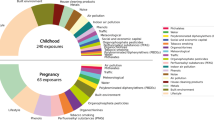Abstract
Drawing upon extant data from existing pediatric cohorts and new follow-up of a diverse set of pediatric cohorts from across the United States, the Environmental influences on Child Health Outcomes (ECHO) Program creates the opportunity for novel and innovative investigations of many previously inaccessible scientific questions in the area of child health. We describe how the large sample size, diversity of participants, emphasis on team science, and infrastructure for improving research methodology make the ECHO Program a major research resource for improving our understanding of early life determinants of childhood health and well-being. Pediatric researchers leverage the unique features of the ECHO Program to address research questions with the potential to yield far-reaching and long-term impacts on child health.
Impact
-
The ECHO Program unites pediatric cohorts from across the United States, allowing for investigations of compelling research questions that were previously infeasible due to limited sample sizes or lack of participant diversity.
-
The focus of the ECHO Program on team science, solution-oriented research, and methodological innovation propels novel scientific investigations that are responsive to the needs of a wide range of stakeholders.
-
Features of the ECHO program’s infrastructure poise its investigators to rapidly launch research endeavors that are responsive to time-sensitive and critical needs within the realm of pediatric research.
Similar content being viewed by others
Log in or create a free account to read this content
Gain free access to this article, as well as selected content from this journal and more on nature.com
or
References
Beck, A. F. et al. Perspectives from the Society for Pediatric Research: interventions targeting social needs in pediatric clinical care. Pediatr. Res. 84, 10–21 (2018).
Etzel, R. A. & Balk, S. J. Pediatric Environmental Health (American Academy of Pediatrics, 2019).
American College of Obstetricians and Gynecologists. American College of Obstetricians and Gynecologists Committee on Health Care for Underserved Women, American Society for Reproductive Medicine Practice Committee, The University of California, San Francisco Program on Reproductive Health and the Environment. Exposure to Toxic Environmental Agents. Committee Opinion Number 575 https://www.acog.org/clinical/clinical-guidance/committee-opinion/articles/2013/10/exposure-to-toxic-environmental-agents (2013).
Paneth, N. & Monk, C. The importance of cohort research starting early in life to understanding child health. Curr. Opin. Pediatr. 30, 292–296 (2018).
Tylavsky, F. A. et al. Understanding childhood obesity in the US: the NIH Environmental Influences on Child Health Outcomes (ECHO) program. Int. J. Obes. 44, 617–627 (2020).
LeWinn, K. Z., Caretta, E., Davis, A., Anderson, A. L. & Oken, E., Program Collaborators for Environmental influences on Child Health Outcomes. SPR Perspectives: environmental influences on Child Health Outcomes (ECHO) Program: overcoming challenges to generate engaged, multidisciplinary science. Manuscript in preparation (2021).
Forrest, C. B., Blackwell, C. K. & Camargo, C. A. Jr. Advancing the science of children’s positive health in the National Institutes of Health Environmental Influences on Child Health Outcomes (ECHO) research program. J. Pediatr. 196, 298–300 (2018).
Jacobson, L., Parker, C., Cella, D., Mroczek, D., & Lester B., Program Collaborators for Environmental influences on Child Health Outcomes. SPR Perspectives: approaches to protocol standardization and data harmonization in the ECHO-wide cohort study. Manuscript in preparation (2021).
ECHO: Environmental influences on Child Health Outcomes. Clinical Trials (ECHO IDeA States Pediatric Clinical Trials Network) https://echochildren.org/idea-states-pediatric-clinical-trials-network/ (2021).
Hall, K. L. et al. The science of team science: a review of the empirical evidence and research gaps on collaboration in science. Am. Psychol. 73, 532–548 (2018).
Jacobson, L. P., Lau, B., Catellier, D. & Parker, C. B. An Environmental Influences On Child Health Outcomes Viewpoint of data analysis centers for collaborative study designs. Curr. Opin. Pediatr. 30, 269–275 (2018).
Smith, B., Knox, S. & Benjamin, D. K. Jr. Coordination of the Environmental influences on Child Health Outcomes program: so the whole is greater than the sum of its parts. Curr. Opin. Pediatr. 30, 263–268 (2018).
Blackwell, C. K. et al. Better sleep, better life? How sleep quality influences children’s life satisfaction. Qual. Life. Res. https://doi.org/10.1007/s11136-020-02491-9 (2020).
McGeachie, M. J. Childhood asthma is a risk factor for the development of chronic obstructive pulmonary disease. Curr. Opin. Allergy Clin. Immunol. 17, 104–109 (2017).
Bui, D. S. et al. Childhood predictors of lung function trajectories and future COPD risk: a prospective cohort study from the first to the sixth decade of life. Lancet Respir. Med. 6, 535–544 (2018).
Costa, D. D., Pitrez, P. M., Barroso, N. F. & Roncada, C. Asthma control in the quality of life levels of asthmatic patients’ caregivers: a systematic review with meta-analysis and meta-regression. J. Pediatr. 95, 401–409 (2019).
Johnson, C. C. et al. Environmental influences on child health outcomes (ECHO) collaborators. US childhood asthma incidence rate patterns from the ECHO consortium to identify high-risk groups for primary prevention. JAMA Pediatr. e210667. https://doi.org/10.1001/jamapediatrics.2021.0667 (2021). Epub ahead of print.
Wang, A., Padula, A., Sirota, M. & Woodruff, T. J. Environmental influences on reproductive health: the importance of chemical exposures. Fertil. Steril. 106, 905–929 (2016).
US Environmental Protection Agency. TSCA Chemical Substance Inventory https://www.epa.gov/tsca-inventory (2020).
Buckley, J. P. et al. Program Collaborators for Environmental influences on Child Health Outcomes. Opportunities for evaluating chemical exposures and child health in the United States: the Environmental influences on Child Health Outcomes (ECHO) Program. J. Expo. Sci. Environ. Epidemiol. 30, 397–419 (2020).
Pellizzari, E. D. et al. Identifying and prioritizing chemicals with uncertain burden of exposure: opportunities for biomonitoring and health-related research. Environ. Health Perspect. 127, 126001 (2019).
Wright, R. O., Teitelbaum, S., Thompson, C. & Balshaw, D. CHEAR Network. The Child Health Exposure Analysis Resource as a vehicle to measure environment in the Environmental influences on Child Health Outcomes Program. Curr. Opin. Pediatr. 30, 285–291 (2018).
Doherty, B. T., Pearce, J. L., Anderson, K. A., Karagas, M. R. & Romano, M. E. Assessment of multipollutant exposures during pregnancy using silicone wristbands. Front. Public Health 8, 547239 (2020).
Lyall, K. et al. Distributional properties and criterion validity of a shortened version of the Social Responsiveness Scale: results from the ECHO program and implications for social communication research. J. Autism Dev. Disord. https://doi.org/10.1007/s10803-020-04667-1 (2020).
ECHO: Environmental influences on Child Health Outcomes. Mission and Guiding Principles https://echochildren.org/echos-guiding-principles/ (2021).
Conradt, E. et al. Prenatal opioid exposure: neurodevelopmental consequences and future research priorities. Pediatrics 144, e20190128 (2019).
ECHO: Environmental influences on Child Health Outcomes. ECHO Program’s Response to COVID-19 https://echochildren.org/echo-programs-response-to-covid-19/ (2021).
National Institutes of Health, U.S. National Library of Medicine, Disaster Information Management Center. Disaster Lit. Environmental influences on Child Health Outcomes (ECHO) COVID-19 Questionnaires https://disasterinfo.nlm.nih.gov/ (2020).
Acknowledgements
We wish to thank our ECHO colleagues, the medical, nursing, and program staff, as well as the children and families participating in the ECHO cohorts. We also acknowledge the contribution of the following ECHO Program collaborators: Coordinating Center—Duke Clinical Research Institute, Durham, N C: P.B. Smith, K.L. Newby, D.K. Benjamin; Data Analysis Center—Johns Hopkins University Bloomberg School of Public Health, Baltimore, MD: L.P. Jacobson; Research Triangle Institute, Durham, NC: C.B. Parker. We would also like to acknowledge and thank the following: Peter Hoffmann, Beth Harris, and Michelle Schreiner. Research reported in this publication was supported by the Environmental influences on Child Health Outcomes (ECHO) program, Office of The Director, National Institutes of Health, under Award Numbers U2COD023375 (Coordinating Center), U24OD023382 (Data Analysis Center), UH3 OD023275, UH3 OD023382, UH3OD023282, and UH3 OD023285. The content is solely the responsibility of the authors and does not necessarily represent the official views of the National Institutes of Health.
Author information
Authors and Affiliations
Consortia
Contributions
All authors contributed to the conception and design of this manuscript and participated in its drafting. All authors have provided final approval of the version submitted for publication.
Corresponding author
Ethics declarations
Competing interests
The authors declare no competing interests.
Consent statement
Patient consent was not required for this review article.
Additional information
Publisher’s note Springer Nature remains neutral with regard to jurisdictional claims in published maps and institutional affiliations.
Rights and permissions
About this article
Cite this article
Romano, M.E., Buckley, J.P., Elliott, A.J. et al. SPR Perspectives: scientific opportunities in the Environmental influences on Child Health Outcomes Program. Pediatr Res 92, 1255–1261 (2022). https://doi.org/10.1038/s41390-021-01577-5
Received:
Accepted:
Published:
Version of record:
Issue date:
DOI: https://doi.org/10.1038/s41390-021-01577-5
This article is cited by
-
Explaining Racial and Ethnic Inequities in SARS-CoV-2-Related Outcomes: Results from a Serosurvey in Chicago
Journal of Racial and Ethnic Health Disparities (2025)
-
Combining developmental and sleep health measures for autism spectrum disorder screening: an ECHO study
Pediatric Research (2025)
-
Approaches to protocol standardization and data harmonization in the ECHO-wide cohort study
Pediatric Research (2024)
-
Maternal stress and early childhood BMI among US children from the Environmental influences on Child Health Outcomes (ECHO) program
Pediatric Research (2023)
-
The NIH ECHO Program: investigating how early environmental influences affect child health
Pediatric Research (2022)



